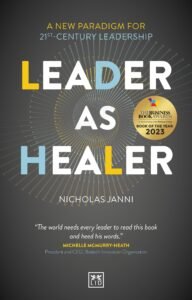A Startup now is operating within a time of profound disruption and instability. This challenges the organisation to find a core ground together within which the stormy seas can be navigated. A ground that calls us to participate with all of our faculties awakened.
I believe that the two essential pillars of this ground are Presence and Purpose
Presence
This is a widely used word yet what does it actually mean? One of the definitions of Presence that I work with is: “I am here, and I am available”, a simple phrase that has many implications.
Firstly, what does it mean to really be here?
We have got used to working while functioning with at best 20-30% of ourselves, because chronically imbalanced ways of thinking and functioning have become the norm in so many corporate cultures, where doing eclipses being, and hyper-rational, analytical thinking relegates feeling, sensing, intuiting and the transpersonal to the outer fringes of life.
 This imbalance is woven into our education system, where left-brain thinking has an ever higher priority. And yet we forget that out thinking function does not experience anything, does not feel anything. So if a person is walking through every day with thinking as their predominant function, they are indeed disconnected, operating within a very limited bandwidth of perception and experience.
This imbalance is woven into our education system, where left-brain thinking has an ever higher priority. And yet we forget that out thinking function does not experience anything, does not feel anything. So if a person is walking through every day with thinking as their predominant function, they are indeed disconnected, operating within a very limited bandwidth of perception and experience.
To be here means that all parts of us are brought to the table – body, heart, mind, intuition, and soul.
This means a complete re-balancing of right and left brain functions, and an integration of Being and Doing.
When we commit to being truly present our development must therefore at a minimum embrace the following key strands:
Practice Embodiment
It is no secret that great ideas coming during physical activity, from cardio to yoga. Practicing this embodiment three to four times a week, even just a walking in nature, can quite literally bring you back to your senses. Making time in the week to pay attention to your sense of physicality will help you strengthen your presence and intuition. Do this as much as possible – before and after zoom meetings for instance. You will feel and come over as much more Present
Emotional integration
Stifling emotions at work is creating unpredictable behaviour and negatively impacts on productivity. We need to understand that there is no such a thing as ‘positive’ and ‘negative’ emotion, and we don’t need to ‘fix it’. Create safe circumstances with colleagues to acknowledge emotions at work, be that fear, sadness, anger, or joy.
Mindfulness
Practicing mindfulness throughout the day expands one’s bandwidth of perception and deepens the capacity for embodied presence. You can use sensations of breathing and your feet touching the ground to as inner anchors of attention. Mindfulness is about learning to pay inner and outer attention at the same time. As you apply this practice, you will notice how much more present you feel and how much better you listen.
The emotional part is also critical in the team space. No emotions need fixing. Sadness and fear are a totally normal and essential part of being human, and being able to share, simply and without drama, how we are feeling, and to have our emotions acknowledged, creates enormous connectedness and is a cornerstone of high performance culture.
I have also found that when teams agree to begin a meeting with two to three minutes of silence the quality of the meeting is often greatly enhanced – less empty talk, more sensing of each other, more listening, and more availability to new ideas.
Then, people are both here and available – to themselves, to each other and to the highest possibilities that want to emerge.
Purpose
Living a life without purpose is like navigating a stormy sea with no rudder, anchor or compass. Purpose is essential. As the Carl Jung reminded us, living without purpose is one of the most grievous wounds of all to the soul.
Purpose is vital for individual well-being, while also being the glue that bonds people in a team or organisation.
The domination of the rational mind and the absence of heart has caused us too often to associate a sense of purpose with endless growth, higher productivity and material gain. We have found ourselves perpetually looking for the next thing: the promotion, salary raise, bigger homes, new cars, and so on. Yet, what is more soul-destroying than devoting 40-80 hours per week to a job whose purpose does not stretch beyond hitting the next quarter’s numbers?
Purpose arises from the deepest essence of who we are, and invites us to reflect deeply about questions such as:
- What is my true gift to life, my innate contribution?
- To what am I most truly devoted?
- What do I really stand for and against?
- What most inspires me, and what breaks my heart?
If each person is asking these questions of themselves, then a group can engage together in a very rich dialogue.
As a Startup:
- What do we really want to contribute to the world?
- What is the unique combination of our individual gifts?
- How do our differences complement each other?
- What would the world look like if our work had its greatest possible impact?
Cultivating Presence and Purpose
Cultivating Presence and Purpose as core pillars of culture bring not only great connectedness, but enhance the possibilities of deeper listening together, of reading complex scenarios with greater precision, and of learning the receptivity that allows higher levels of insight and solution to emerge in the meeting space. It permits teams to cultivate the essential capacity to ride the turbulent waters of ‘not-knowing’ without rushing to fix things too quickly in order to appease the discomfort.
To sit together in Presence, while aligned with Purpose.
In the work of reconnecting the body, mind and heart, the individual Leader as Healer is one who has developed a strong self-sense, a grounded presence, and a willingness to lean into what he or she stands for and against. The Leader as Healer learns to engage with emotions; to sit with them in openness and receptivity for as long as required. This self-knowing is essential for questions of purpose, and the lack of it may cost us dearly.
Teams include all the above individual traits, and must learn what it means to be both intentional and surrendered, able to embrace the volatility, uncertainty, complexity and ambiguity of our time, so as to become agents through which radical disruption transmutes into radical opportunity, and planetary crisis into global transformation.
Nicholas Janni is the co-founder of Matrix Leadership Development and the author of Leader As Healer, Business Book of the Year 2023.

|
Free Tide Business Bank Account + £50 Cashback!Simply open a free business current account to qualify + 12 months free transactions. Read our Tide review. Open a Tide savings account at the same time and earn an excellent 4.07% AER (variable) on your spare funds. |










